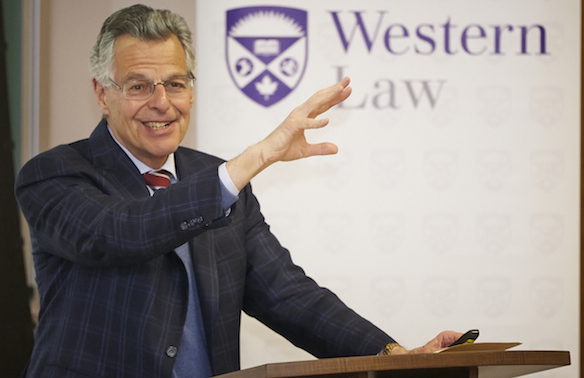Nobel Prize Winner delivers Annual Western Law Business and Law Lecture
April 06, 2015

Myron Scholes
Western Law was pleased to welcome Nobel prize winning economist Myron Scholes on March 31 to deliver the 6th Annual Western Law Business and Law Lecture, part of Western Law’s Torys LLP Corporate and Securities Law Forum. Scholes was the co-recipient of the 1997 Nobel Prize in Economics for his pioneering work with Fischer Black and Robert C. Merton in developing the groundbreaking Black-Scholes option pricing model.
In introducing Professor Scholes to a standing-room only audience at Western Law Professor Christopher Nicholls noted that the Black-Scholes option pricing paper was recently described by 2013 Nobel Laureate Eugene Fama as “the most important paper in economics of the 20th century.”
The title of Scholes’ lecture was "The Costs of Constraints: Risk Management, Agency Theory and Asset Prices," and was based on a paper he co-authored with Ashwin Alankar and Peter Blaustein.
For many years, financial economists have observed apparent anomalies in the pricing of financial assets. For example, stocks with higher “betas” (in other words, greater market or systematic risk) should, according to financial theory, earn higher returns than stocks with lower “betas”. But in fact, low beta stocks frequently outperform high beta stocks. Scholars have offered various explanations for these anomalies. Perhaps there are hidden risks that account for the higher returns or practical limits in the real world to the buying and selling of assets that are evidently mispriced (so-called “limits to arbitrage”) that prevent market prices from adjusting. Perhaps, as behavioral economists argue, investors are irrational, and prone to specific cognitive biases that lead them to bid up mistakenly the price of certain assets.
Scholes and his co-authors offer a different explanation. The key to these pricing anomalies, they argue, may actually lie in rational decisions made by sophisticated investment managers who are subject to specific investment constraints of tracking error or liquidity. In other words, pricing anomalies are not the result of mysterious hidden risks or irrational behavioral anomalies.

Professor Chris Nicholls and Myron Scholes
Instead, “investment managers rationally chose to hold inefficient portfolios to meet investment constraints,” said Scholes. And of course if many investment managers face the same constraints, they will, rationally, demand the same (high volatility) assets. That demand, in turn, will drive up the price of those assets, higher than the prices predicted in standard asset-pricing models that assume that market players are not subject to such constraints.
The implications of this research are significant. The costs of benchmarking and tracking error constraints, as Dr Scholes demonstrated, could be very significant and have important implications for investors, the investment management industry, and, by extension, the legal and regulatory environment in which they operate.
“Myron Scholes is one of the most important economists and innovative thinkers of our time,” said Professor Christopher Nicholls, noting that this was Scholes’ second visit to Western Law. “Many students who met Prof. Scholes when he last visited the law school described the experience as one of the highlights of their time at Western Law. I’m pleased to say that his visit last Tuesday was equally exciting for our current cohort of students and for many other members of the Western community.”
The Western Law Business and Law Lecture was originally launched thanks to a generous gift from Western alum Geoff Beattie, LLB’84. Western Law is also grateful for the support this year of Western University’s Centre for Financial Innovation and Risk Management (CFIRM). Past speakers in this distinguished lecture series include two other Nobel Prize-winning economists—Robert Shiller and George Akerlof—as well as Leo E. Strine Jr., Chief Justice of the Delaware Supreme Court, Lawrence Summers, former U.S. Treasury Secretary and President Emeritus of Harvard University, and prominent Yale University economist Gary Gorton.






